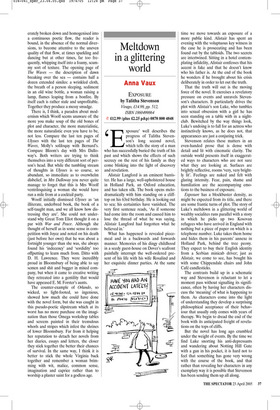Meltdown in a glittering world
Anna Vaux
EXPOSURE by Talitha Stevenson Virago, £14.99, pp. 512, ISBN 1860499864 ✆ £12.99 (plus £2.25 p&p) 0870 800 4848 ‘Exposure’ well describes the progress of Talitha Stevenson’s long second novel, which tells the story of a man who has successfully buried the truth of his past and which shows the effects of such secrecy on the rest of his family as they come blinking into the light of discovery and revelation.
Alistair Langford is an eminent barrister. He has a large, well-upholstered house in Holland Park, an Oxford education, and has taken silk. The book opens melodramatically with him standing on a clifftop on his 63rd birthday. He is looking out to sea; his certainties have vanished. The very first sentence reads, ‘As if someone had come into the room and caused him to lose the thread of what he was saying, Alistair Langford had forgotten what he believed in.’ What has happened is revealed piecemeal and in a backwards and forwards manner. Memories of his dingy childhood in a seedy guest-house on Dover’s seafront painfully interrupt the well-ordered present of his life with his wife Rosalind and her exquisite dinner parties. At the same time we move towards an exposure of a more public kind. Alistair has spent an evening with the voluptuous key witness in the case he is prosecuting and has been found out by the tabloids. The two secrets are intertwined. Sitting in a hotel contemplating infidelity, Alistair confesses that his accent is fake and that he doesn’t know who his father is. At the end of the book he wonders if he brought about his crisis deliberately in order to let out the truth.
That the truth will out is the moving force of the novel. It exercises a revelatory pressure on events and unravels Stevenson’s characters. It particularly drives the plot with Alistair’s son Luke, who tumbles into sexual obsession with a girl he has seen standing on a table with in a nightclub. Bewitched by the way things look, Luke’s undoing is to fall for an actress who instinctively knows, as he does not, that appearances are just a conjuring trick.
Stevenson relates these matters in an even-handed prose that is dense with detail and lit with cinematic clarity. The outside world presents itself in exaggerated ways to characters who are not sure what they are looking at. Surfaces are brightly reflective, rooms ‘very, very brightly lit’. Feelings are naked and felt with glaring intensity. Fear, pain, shame and humiliation are the accompanying emotions to the business of exposure.
Exposure has a blockbuster density, as might be expected from its title, and there are some frantic turns of plot. The story of Luke’s meltdown in a glittering world of wealthy socialites runs parallel with a story in which he picks up two Kosovan refugees who have arrived in England with nothing but a piece of paper on which is a telephone number. Luke takes them home and hides them in his parents’ annexe in Holland Park, behind the tree peony. They expect to buy their English identity from a Serbian minicab driver; just as Alistair, we come to see, has bought his with some Chippendale chairs and John Café candlesticks.
The contrasts build up in a schematic way and Stevenson is reluctant to let a moment pass without signalling its significance, often by having her characters discuss the ‘meaning’ of what is happening to them. As characters come into the light of understanding they develop a surprising philosophical acceptance of their behaviour that usually only comes with years of therapy. We begin to dread the end of the book with its anticipated freight of revelations on the tops of cliffs.
But the novel has long ago crumbled under the weight of events. By the time we find Luke snorting his anti-depressants and wandering about Notting Hill Gate with a gun in his pocket, it is hard not to feel that something has gone very wrong with the course of the book, and that rather than revealing her characters in any exemplary way it is possible that Stevenson has been sending them up all along.



















































 Previous page
Previous page